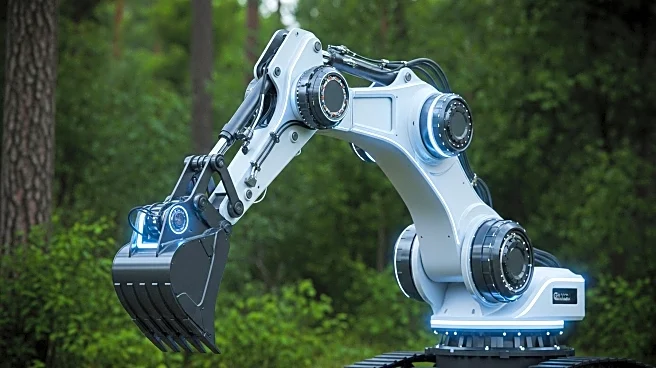What's Happening?
The excavator industry is undergoing significant transformation in 2025, driven by advancements in sensors, artificial intelligence, and automation. These technologies are reshaping how excavators operate, offering precision guidance, predictive maintenance, and remote or autonomous operation capabilities. Manufacturers like Develon, Hitachi Construction Machinery, and Caterpillar are integrating AI-driven controls and automation features into their models, allowing for semi-autonomous and fully remote operations. This shift is influencing buying decisions, with contractors now considering integrated technology packages alongside traditional factors like horsepower and fuel consumption. The latest models also feature advanced sensor systems, including LiDAR, radar, and HD cameras, which enhance safety and productivity by providing real-time environmental mapping.
Why It's Important?
The integration of AI and automation in excavators is crucial for improving efficiency and sustainability in the construction industry. These technologies reduce fuel consumption and downtime, leading to cost savings and increased productivity. The move towards hybrid and electric models further supports environmental goals by cutting emissions and noise pollution. As global construction tenders increasingly require sustainable practices, the adoption of these advanced excavators positions companies to meet regulatory demands and gain competitive advantages. Additionally, the ability to operate excavators remotely enhances safety by minimizing human exposure to hazardous environments, while AI-driven predictive maintenance reduces the risk of equipment failure.
What's Next?
The future of excavators is likely to see further advancements in digital twin technology, allowing real-time data from machines to be mirrored in virtual models for jobsite simulation. Swarm automation, where multiple excavators coordinate autonomously, is also in pilot testing, promising to redefine jobsite management. Material science breakthroughs may lead to lighter, stronger components, enhancing efficiency without compromising power. As AI technology continues to evolve, excavators are expected to integrate more deeply with site-wide autonomous ecosystems, working seamlessly with other construction equipment like dozers and haul trucks.
Beyond the Headlines
The shift towards AI and automation in the excavator industry raises ethical and cultural considerations, particularly regarding the changing role of human operators. As machines become more autonomous, operators may transition into supervisory roles, overseeing fleets rather than controlling individual movements. This evolution requires retraining and adaptation, potentially impacting employment patterns in the industry. Furthermore, the reliance on advanced technology necessitates robust cybersecurity measures to protect against potential threats to equipment operation and data integrity.









